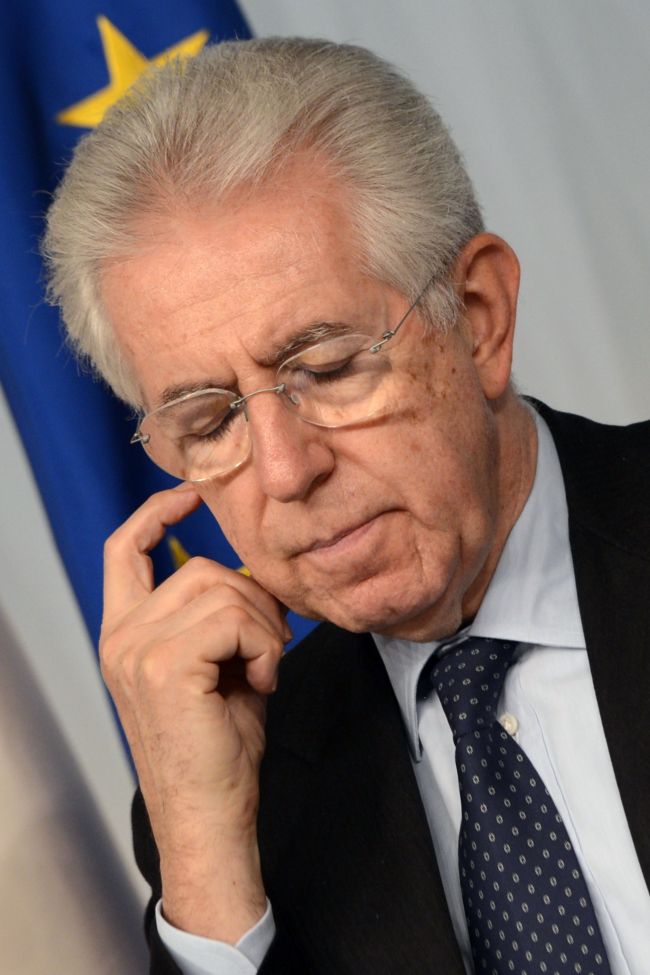 |
Italian Prime Minister Mario Monti.( AFP-Yonhap News) |
ROME (AP) ― Seeking to calm financial markets, Premier Mario Monti said Monday he will lead Italy until the next government takes power, insisting there will be “no decision-making vacuum” despite his intention to resign ahead of time.
What happens after the election, however, kept markets on edge, sending stocks and bonds plunging.
Monti announced Saturday he is resigning early because Silvio Berlusconi’s party, Parliament’s largest, yanked its support for his economic policies. The same day, Berlusconi said he was running to get the premiership back, despite his party’s lagging in the opinion polls.
Italian markets slumped as investors feared a new era of political instability. Some worry that a return to party politics under an elected government could threaten the reforms that Monti has been pushing through to restore confidence in the country’s financial future.
From Oslo, Norway, where he was attending the Nobel Peace Prize award to the EU, Monti said Monday that the financial market drops in Italy “shouldn’t be dramatized.”
He also said he was “fully confident” that the next government will be “highly responsible” and “in line” with policies needed for the good of Italy’s economy and the European Union in a wider context.
Monti was tapped by Italy’s president to lead the country in late November 2011 after Berlusconi resigned, having lost the confidence of international markets in his ability to save the country from a Greek-style debt crisis. Monti, a respected economist and former European Union commissioner, won back a degree of international credibility for the country through a series of tax hikes and fiscal reforms that were deeply unpopular at home.
He will step down as soon as Parliament passes the 2013 budget law later this month. His term was due to end by April, and his resignation would move up elections by about two months.
Led by plunging bank shares, Italy’s main stock index, the FTSE MIB, closed 2.2 percent lower. The interest rate on the 10-year government bond ― an indicator of how risky investors consider a country’s ability to pay its debt ― rose 0.28 percentage points to 4.75 percent.
While that rate is manageable, and still well below the 6.4 percent high hit in July, the daily rise was worryingly sharp.
“The markets must not fear a decision-making vacuum,” Monti said, noting that the government will continue running the country even after the Parliament is dissolved ahead of the new elections.
“The government is in charge in all its powers,” he said.
Asked if he would run in the elections, Monti indicated he didn’t want any electoral campaign to distract him from his government’s task of restoring Italy’s finances and economy back to health.
“I am not considering this question in this phase. All my efforts are now concentrating on completing the remaining time for this government. It seems to be that the time is limited enough to require intense application of mind and energy,” Monti said.
Explaining his decision to leave before his term was up, Monti said it was impossible to continue after Berlusconi’s forces withdrew support for his economic policies. His government was endorsed by the two largest political parties, including Berlusconi’s.
In ending his support for Monti’s measures, Berlusconi contended that the government’s recipe for severe austerity is doing nothing to lift Italy of recession.
Without Monti in the race, the strongest candidate in opinion polls as been center-left leader Pier Luigi Bersani. Although Bersani staunchly backs the Monti government, left-wing lawmakers have been wary about labor market reform plans.
Berlusconi has been taking a populist line, saying he would abolish a property tax that Monti imposed to bring in badly needed revenue. Monti warned of the “risk of a populist drift in economic politics.”
But he professed confidence in the voters, who in polls have said they like Monti. “The Italian citizens are mature, they aren’t fools,” he said.
Despite his efforts to calm markets and fellow European leaders, Monti’s decision to resign soon “has clearly been met with anxiety in the markets, with Monti’s government seen as imperative to Italy’s stability,” said Craig Erlam, market analyst for London-based Alpari.
Leaders of small, centrist parties in Italy have been wooing Monti to come onto their ticket. Before Monday, Monti had ruled out running for office but indicated he might accept some role in government if asked.
European leaders, who collectively sighed in relief when Monti was appointed, did not hide their concern over news that he was leaving prematurely and that Berlusconi, with his personal scandals and legal woes, was back in the political fray.
“Italy has two-thirds of the route of reform behind it, but the final third is now decisive and so a halt to the policy of reform would entail not just a significant weakening of Italy, but also could bring new turbulence to Europe,” German Foreign Minister Guido Westerwelle told reporters in Brussels.
Outside of Italy, European financial markets eked out small gains at the end of the day, as some investors reassessed their concerns over Italy and focused instead on improvements in U.S. budget talks, which are critical to the health of the U.S. ― and global ― economy.
Berlusconi’s judicial woes and not just his political ambitions were in the spotlight Monday. He is on trial in Milan for allegedly paying for sex with an underage Moroccan woman and then using his office to cover it up. He and the woman deny the accusations.
The woman, Karima el-Mahroug, was due to testify Monday but didn’t show up, telling her lawyer in a text message that she was out of the country and giving no indication when she would return, news reports said.
Prosecutor Ilda Boccassini contended in court that el-Mahroug, known as Ruby, had been kept away by Berlusconi’s defense to delay the trial until after elections. But Berlusconi attorney Niccolo Ghedini denied that, calling the prosecutor’s contention “defamatory.”








